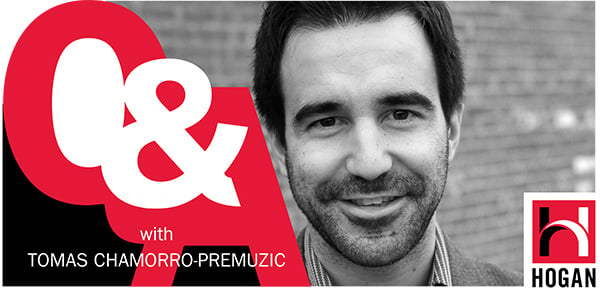
Who wouldn’t want a higher level of emotional intelligence?
“Studies have shown that a high emotional quotient (or EQ) boosts career success, entrepreneurial potential, leadership talent, health, relationship satisfaction, humor, and happiness,” says Dr. Tomas Chamorro-Premuzic.
We sat down with the VP of Innovation and Research to pick his thoughts on emotional intelligence. Here’s what he had to say…
It’s not a secret that people with higher EQ are more rewarding to deal with. Is it possible to raise our EQ?
Your level of EQ is firm, but not rigid. Our ability to identify and manage our own and others’ emotions is fairly stable over time, influenced by our early childhood experiences and even genetics. That doesn’t mean we can’t change it, but, realistically, long-term improvements will require a great deal of dedication and guidance.
Does EQ change over time?
Fortunately, EQ tends to increase with age, even without deliberate interventions. That’s the technical way to say that (most people) mature with age. The bottom line is that some people are just naturally more grumpy, shy, self-centered or insecure, while other people are blessed with natural positivity, composure, and people-skills. However, no human behavior is unchangeable.
Do EQ coaching programs work?
Yes. Although no program can get someone from 0 to 100%, a well-designed coaching intervention can easily achieve improvements of 25%. Various meta-analyses suggest that the most coachable element of EQ is interpersonal skills — with average short-term improvements of 50%. Think of it as teaching negotiation and social etiquette — what the great Dale Carnegie called “how to win friends and influence people.”
So we can learn empathy?
Even empathy can be trained in adults. The most compelling demonstration comes from neuropsychological studies highlighting the “plasticity” of the social brain. These studies suggest that, with adequate training, people can become more pro-social, altruistic, and compassionate.
Which is easier to change – reputation or identity?
Everyone can change, but few people are seriously willing to try. Think about the worst boss you ever had — how long would it take him to start coming across as more considerate, sociable, calm or positive? And that’s the easier part — changing one’s reputation. It is even harder to change one’s internal EQ; in other words, you might still feel stressed out or angry on the inside, even if you manage not to show those emotions on the outside.
Are individuals good judges of EQ?
Most of us are generally unaware of how others see us — and this especially true for managers. A recent meta-analysis shows that the relationship between self- and other-ratings of EQ is weak (weaker, even, than for IQ). In other words, we may not have a very accurate idea of how smart we are, but our notion of how nice we are is even less accurate. Thus any intervention focused on increasing EQ must begin by helping people understand what their real strengths and weaknesses are..
Are certain people more changeable than others?
Yes, some people are more capable of changing than others. Ironically, those individuals tend to be more pessimistic about their very chances of changing. Indeed, neurotic, introverted and insecure people are more likely to change, whereas highly adjusted and resilient individuals are less changeable. Likewise, optimism breeds overconfidence and hinders change by perpetuating false hopes and unrealistic expectations. There is an old joke about how many psychologists it takes to change a light bulb. Just one — so long as the light bulb wants to change.
Besides coaching, how can we improve our EQ?
The recipe for self-change is fairly straightforward — it is just hard to implement. In order to change, we need to start by building self-awareness, which is best achieved by obtaining (and believing) honest and critical feedback from others. Next, we must come up with a realistic strategy that focuses on attainable goals, such as changing a few specific behaviors (e.g., more eye contact, less shouting, more smiling, etc.) rather than substantial aspects of our personality (e.g., interpersonal sensitivity, empathy, and sociability). Finally, we will need an enormous amount of effort and dedication in order to both attain and maintain any desired changes — or we will quickly revert to our old habits.




 Hogan’s scientific foundation and commitment to research distinguishes us from the competition. Each year, Hogan and our affiliates publish works that contribute to the knowledge and development of (a) the Hogan assessments and (b) the field of personality and psychology. These publications build the Hogan brand and allow us to better serve our clients worldwide.
Hogan’s scientific foundation and commitment to research distinguishes us from the competition. Each year, Hogan and our affiliates publish works that contribute to the knowledge and development of (a) the Hogan assessments and (b) the field of personality and psychology. These publications build the Hogan brand and allow us to better serve our clients worldwide. After a rigorous selection process designed to gauge student’s leadership potential that began last October, Odgers Berndston, a leading global executive search firm, has identified 11 Canadian students to spend a day shadowing some of the country’s top senior executives in the company’s launch of
After a rigorous selection process designed to gauge student’s leadership potential that began last October, Odgers Berndston, a leading global executive search firm, has identified 11 Canadian students to spend a day shadowing some of the country’s top senior executives in the company’s launch of  Hogan announced a strategic partnership with
Hogan announced a strategic partnership with 
